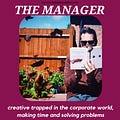Hi everyone,
I hope you are safe and well. Weird times here in the UK right now. The weather today was madness. Thunderstorms, heavy rain and now bright sunshine. And a balmy 20 degrees C over the weekend! And of course, the economy, inflation and the like. If I ponder it too long I get a headache.
So, I won’t ponder it.
Instead, today I’m going to talk a little about creativity, finding time and working out what problem we’re trying to solve.
Before we dive in, I’d like to let you know I shipped a new video to the channel this week. It’s all about my new analogue personal knowledge management system. A new change to my learning process.
Find time by only solving important problems
I remember reviewing some objectives in a company once for the exec of a central services team - you know - a team that supports other teams in the business.
One of the objectives was to meet every single Vice President in the company and build a relationship with them.
I paused and asked the execs what problem they were trying to solve by asking their Team Leads to meet the VPs (of which there were about 150!).
They said it was to “sell the service” and “understand demand”. But this was a part of the business that already had more demand than they could shake a stick at.
I suggested that this wasn’t the real problem and that if the Team Leads spent their days meeting the VPs they wouldn’t be doing anything else. Is this what they wanted? Team leads spending a couple of months to sell a service that was already over-subscribed? After all, if they did this nothing else would get done.
They agreed it sounded silly in hindsight.
So, I asked them to lift themselves up a level and ask what problem VPs knowing about the service would solve. And they said “so we can priorotise our work”.
And this was the real problem to be solved.
Meeting VPs was a potential solution to this problem and as such it had become a key indicator, a result, an outcome, something easy to measure and write down.
After some brainstorming they came up with several new ways to solve the prioritisation problem that didn’t rely on people spending months meeting other people to sell something that was already in hot demand.
At work we should always be trying to discover what problem we’re trying to solve. Keep going up or down until you hit the root cause. And then ask a couple of other powerful questions:
Now we understand the problem, is it really a problem that’s worth solving? (i.e. should we give up something else to address this?)
And how do we know it’s a problem? (i.e. show me the data)
And how will we know when we’ve solved it? (i.e. show me how you’ll measure success).
I often find most problems in business aren’t worth solving or we cannot clearly articulate why it’s a problem or it’s less important than others, or more importantly, it’s not a problem stopping us from achieving our goals.
Yet, unless we ask critical questions we may end up doing plenty of work that doesn’t solve the right problems. Every day in our workplaces there are people using energy and attention to solve the wrong problems, or even worse, doing work that has no obvious tangible benefit to the business.
I recommend starting with the simple idea of this (and it works in our own lives to):
If I do THIS work, I can’t do THAT work. Is that what I want to focus on?
Creative trapped in a corporate job
I often describe myself as a creative trapped in a corporate job. I live and breathe creativity and would spend my days creating art, books, music, films, posters and more - if I could. I’m sure many of you would like to do that also.
But alas, I exist in the corporate world and try to weave creativity into that world as much as I can, and reserve my personal art to my own time.
In fact, some of you may remember I dropped a free 30 day guide to creativity earlier this year. The PDF is still here if you’d like to read more.
And yes, I appreciate that almost all business work is creative due to the nature of bringing something to life, and many of us work in “creative industries” but many of us are also trapped in companies where focussed creativity is seen as a nice to have and something to do if we have time. That 30 day guide was a challenge to that thinking.
Anyhow, this last week I revisited a coffee table book that takes pride and place on my sideboard in the studio. A book called Mirror Sound (amazon affiliate link) - a journey through the creative process of self-recording music.
It’s a cracking book.
A theme that runs through mirror sound is investment.
Not financial investment (in self recording that could bring a new set of problems), but investment of time, energy, learning and adaptability. The same things most businesses need more of.
Learning new digital recording tools, exploring how they work and how to create the sound you want. Investing time in learning, recording, editing etc. Investing time in bringing to life something you imagined - and interestingly, letting go of the perfect image you expect once you start creating. Investing in relationships, communities and shared spaces for creativity to work.
All valuable lessons we can bring to our workplaces but it requires people in business to find space for this to happen. And that can be hard if you’re simply delivering with no time to reflect or consider a different way to do something.
As a manager I’ve always tried to focus on investment in things that aren’t directly financial (after all, every activity in business is ultimately a use of
Investment in training, coaching, learning, down time, social responsibility activities, time to improve a process etc.
Investments in these areas outside of finance come back to you ten-fold by creating a space for creativity to happen. And creativity creates good places to work where innovation can thrive.
Let me know how you weave in creativity to your work place.
Twitter - The Bird is free…apparently
I don’t go on Twitter very often, maybe once a week to check on a few interesting accounts. But it seems it’s all getting a little messy now Elon Musk has taken over. I personally couldn’t care less about Twitter and what happens, but I do like to learn from how leaders and managers conduct themselves and their work.
I’ll watch from the sidelines as Elon Musk brings his strong personality to Twitter. I get the impression he’s trying to mould it into a mirror of his own personality - and I’ve worked in many businesses where the owners have done that…..with disastrous effects. But it’s also interesting how he has no clear vision for it, how he wants to encourage more free speech but keep the hate out for advertisers and how he expects to make a return on a whopping investment.
With prominent people leaving the platform and business already, advertisers clearly cautious and the rise in hate posts already, it will be an interesting journey to watch from the side.
Clarity is essential for a business. A plan is needed. And a positive workplace too. Can he deliver on these, or was this a monumentally expensive vanity project? And how will Tesla’s shareholders respond if it all goes south at Twitter? Interesting times in business. There will be some lessons in this story no doubt.
Interesting Links
I’ve had a super busy week so not had much time to do my usual reading - so only a few this week. I’ll dig through my subscriptions and sources this week for more goodness in the next one.
Love this newsletter about purpose - as in purpose is made not found - and plenty of good posts on how to apply this in work and life.
How to make time for what you love. If we want to do something we have to find time for it.
Michael Crichton’s writing routine - chaotic and manic compared to John Grisham. Nice to see a bit of balance coming to Cal Newports excellent, but often based on slow-productivity, blog. I tend to be chaotic. A hundred projects on the go. What about you?
Plenty of bad language but this article about the music industry being the canary in the coal mine when it comes to digital disruption is very interesting. We have more choice on what we listen to and the old paradigms are dying out - just because it’s scary doesn’t make it fake. People still want music but they’re overwhelmed by how much choice and are choosing carefully how to use their energy and attention.
The bird is fried - a good take on the Twitter / Musk story.
Until next week
Rob



